How to rebuild a city with Karam Alkatlabe

We welcome everyone who has an interest in health. Get involved with the Hub by contacting us at gh-hub@wolfson.cam.ac.uk or subscribe to our mailing list.
Check again near the start of Michaelmas for our upcoming term card, or let us know about what events you would like to see!
If you would like us to advertise your event, please contact us at gh-hub@wolfson.cam.ac.uk
What are the challenges of neglected tropical diseases and how can public health leaders address these across the globe?

At this Global Health Research Hub event, Wolfson Fellow Dr Aliko Ahmed hosted a talk by Dr Socé Fall followed by an interactive debate on strategies to combat neglected tropical diseases across Africa.
Dr Socé Fall presented his insights into Global Public Health Leadership, the global burden of neglected tropical diseases, and his commitment and strategy to address these challenges. Dr Ahmed has had a long professional relationship with Dr Socé Fall via years of working across several GH initiatives - they explored this wider agenda with other panellists and the audience.
Speaker
Dr Socé Fall, as he is universally known, is a public health scholar, global health leader and infectious diseases epidemiologist. He is the director of the Global Negelcted Tropical Diseases programme at WHO Geneva. Most recently (2019–2022), he served as Assistant Director-General in charge of WHO’s emergency response, leading the Organization’s response to high-impact epidemics, humanitarian crises and acute public health events at global level. His previous roles include: the Regional Emergency Director in WHO’s African Region; the WHO Representative in Mali, during which time he was appointed by the United Nations Secretary-General as Head of the United Nations Mission for Ebola Emergency Response; and WHO regional advisor in charge of strategic planning for the malaria control programme.
Wolfson Researchers and AlumniWRE student presenters, Interdisciplinary Research Hubs, Science Society, Humanities Society, wider Wolfson community
05 May 2023 at 17.15 - 18.45
Lee Hall, Wolfson College
Dr Lara Urban - Principal Investigator in Genomics and AI for One Health
16th May 2023 17.00 - 18.00
This insightful Green Talk was shared on the vital concept of One Health, which has been catapulted into the public spotlight due to the COVID-19 pandemic. Our speaker Dr Lara Urban will delve into the exciting potential of disruptive technology that allows real-time genomic analyses at the point of care, empowering efficient intervention strategies for biodiversity, ecosystem functions, and individual health. Lara shared her research group's groundbreaking work, combining genomics and Artificial Intelligence (AI) to assess emerging pathogens in the environment, inform about medical resistances in hospitals, and contribute to real-world wildlife conservation management. Lara discussed the societal implications of such disruptive technology – its potential to increase global equity and inclusion in the context of One Health - but also its challenges in the light of indigenous rights, scientific colonialism, and requirements of the Nagoya Protocol.
This event was in collaboration with theCambridge University One Health Society, Wolfson Humanities Society, Wolfson Interdisciplinary Research Hub in Global Health and Wolfson Interdisciplinary Research Hub in Sustainability & Conservation.
Dr Lara Urban spent three and a half years at Wolfson College obtaining her PhD in statistical genomics fromEMBL-EBI and the University of Cambridge in 2019. As an independent Humboldt Research Fellow in New Zealand, Lara then combined this expertise with her background in ecology, and applied genomics and machine learning in the context of nature conservation. In 2022, Lara obtained a Helmholtz Principal Investigator Grant to start her own research group at the Helmholtz AI Institute, the Helmholtz Pioneer Campus, and the Technical University of Munich.
Globally, progress in meeting the syndemic challenge of poverty and tuberculosis has been reversed due to a combination of political failures, economic instability and the COVID-19 pandemic. This talk details the experiences of people living with tuberculosis in London as described in the Lancet’s 2022 Wakley Prize winning essay, highlighting the reality of health inequalities at home.
Dr Padmasayee Papineni is a Consultant in Infectious Diseases and Acute Medicine at London North West University Healthcare NHS Trust. She has a B.Sc. in International Health from University College London, a Diploma in Clinical Tropical Medicine from Universidad Peruana Cayetano Heredia, Peru and a Diploma in HIV Medicine. From 2014-2017 she was project leader for a multi-centre TB clinical trial across Asia, based at National University Singapore. Papineni lectures on the Asian Diploma in Tropical Medicine at Nagasaki University, Japan, and is the co-chair for the Professional Expert Panel of the UK-REACH study to understand COVID-19 outcomes in ethnic minority healthcare workers.
Friday 10th March 2023
Health and well-being are determined not only by our genes and personal characteristics but also by the physical and social environments in which we live our lives. Environments play an important role in determining our physical and mental capacity across a person’s life course and into older age and also how well we adjust to loss of function and other forms of adversity that we may experience at different stages of life, and in particular in later years. Both older people and the environments in which they live are diverse, dynamic and changing. In interaction with each other they hold incredible potential for enabling or constraining healthy ageing.
Age-friendly cities and communities are environments where we grow, live, work, play, and age well. They are crucial to our well-being by providing opportunities for everyone to participate and thrive, resulting in improved physical and mental health, increased social connections and intergenerational solidarity, and social and economic gains. For example, by promoting inclusive and age-friendly policies, such as transportation options, accessibility in public spaces, and social and recreational opportunities, age-friendly environments can reduce the risk of falls by 30%, reduce the rate of depression by 22%, and lead to a 15% reduction in healthcare costs for older adults, with a return of $3 in savings on healthcare and other services for every $1 invested. Platforms of action already exist, with concrete examples and solutions of what to do and avoid, including the WHO Global Network for Age-friendly Cities and Communities, currently with 1445 cities and communities in 51 countries, with the majority in high-income countries.
Given that both population ageing and urbanization are mainly driven by low-and-middle income settings today and in the years to come, this session discussed how to expand and sustain action to create age-friendly cities and communities in those regions, supporting longer and more independent lives for this and future generations of older persons and a more inclusive and equitable society for all.
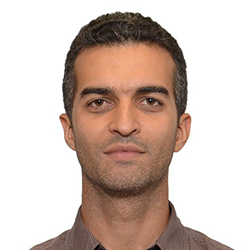 Dr Thiago Herick de Sa holds a degree in Sports Science, and Masters and PhD degrees in Public Health. He started his career as a physical educator, working with older people at hospitals, primary care settings and households in Brazil. From 2010, Thiago worked as a researcher in Brazil and in the UK, with a track record of scientific publications in high-impact journals.
Dr Thiago Herick de Sa holds a degree in Sports Science, and Masters and PhD degrees in Public Health. He started his career as a physical educator, working with older people at hospitals, primary care settings and households in Brazil. From 2010, Thiago worked as a researcher in Brazil and in the UK, with a track record of scientific publications in high-impact journals.
Thiago joined WHO in 2017 to support the work around urban, transport and health, including the development of WHO’s Urban Health Initiative (ongoing) and WHO’s Urban Health Research Agenda (2022). He also led the development of several technical resources such as the Sourcebook on Integrating Health in Urban and Territorial Planning (2020) and the adaptation for global use of the HEAT tool (2021).
In 2022, Thiago joined the Department of Social Determinants of Health to lead the work on Age-friendly environments, including the Global Network for Age-friendly Cities and Communities.
Friday 10th March 2023
National Gallery Singapore, Rooftop Studios
Tuesday 29 November, 19:00
Reception and “In Conversation” with Hon Fellow Prof Gordon Dougan (2008) FRS FMedSci and leading industry peers on “Entrepreneurship for Equitable Access to Global Health”. The evening was kindly supported by the National Gallery Singapore.
On the 7th of October, The Wolfson Science Society and the Interdisciplinary Global Health Research Hub with Wolfson Fellow Prof. Nick Wareham hosted an interactive talk with esteemed WHO health leader and former Minister of Health and Education in Iraq, Prof. Ala Alwan to discuss the rise of non-communicable diseases (NCDs) and their impact on global health and development.
The event featured and insightful and though-provoking talk by Prof. Alwan and Q&A led by a panel of Wolfson academics, including Fell Tolu Oni, Junior Research Fellow Tom McCoy and PhD students Lambed Tatah and Anna Brugulat Panes.
Key Insights from the Discussion:
View the full event here:
In October 2022, over 30 Research Leads and Early Career Researchers from South Africa, Jamaica, Cameroon, Kenya, Nigeria and Brazil travelled to Cambridge to attend the Global Diet and Activity Research (GDAR) network’s annual meeting in October 2022.
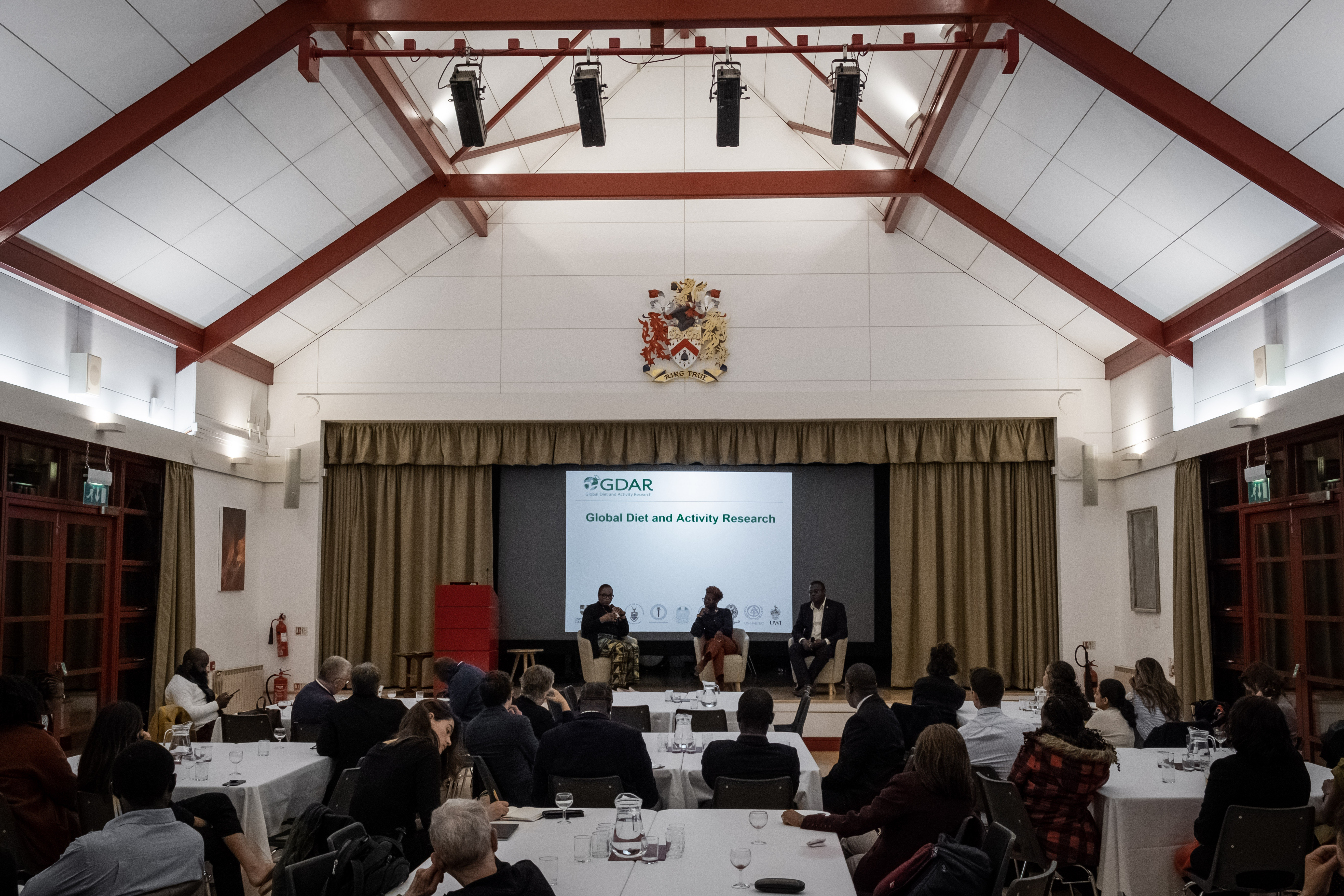
As part of the events, Wolfson College hosted a dinner to provide the wider Wolfson community with the opportunity to engage with the GDAR network. The evening also featured a panel discussion with two of the Principal Investigators from Nigeria and Cameroon, Taibat Lawanson, who is Professor of Management and Governance at the University of Lagos, Nigeria, where she leads the Pro-poor Development Research Cluster, and the co-director at the University of Lagos Centre for Housing and Sustainable Development; and Felix K. Assah, who is a Wolfson alum and currently a Senior Lecturer of Epidemiology, at the University of Yaounde and an epidemiologist with the Cameroon Ministry of Public Health. The discussion drew upon the network’s experiences in setting-up community led interventions to encourage dietary choices among young people, and on multisectoral approaches to increasing access to health-enabling urban environments.
A video shown at the discussion regarding GDAR’s work can be viewed here.
More than 20 researchers from 7 Departments/Research Centres across Cambridge recently came together at Wolfson to attend an in-person workshop to share and discuss research on play and family wellbeing.
The “Play and Family Wellbeing Workshop” was organised by Dr Zhen Rao, a Wolfson Junior Research Fellow and a researcher at the Centre for Research on Play in Education, Development & Learning (PEDAL Centre) at the Faculty of Education. In addition to the PEDAL Centre and the Faculty of Education, attendees of the workshop Centre have come from Centre for Family Research, Department of Psychology, Department of Psychiatry, MRC Epidemiology Unit, Applied Social Science Group in Department of Public Health and Primary Care, and Institute of Criminology.
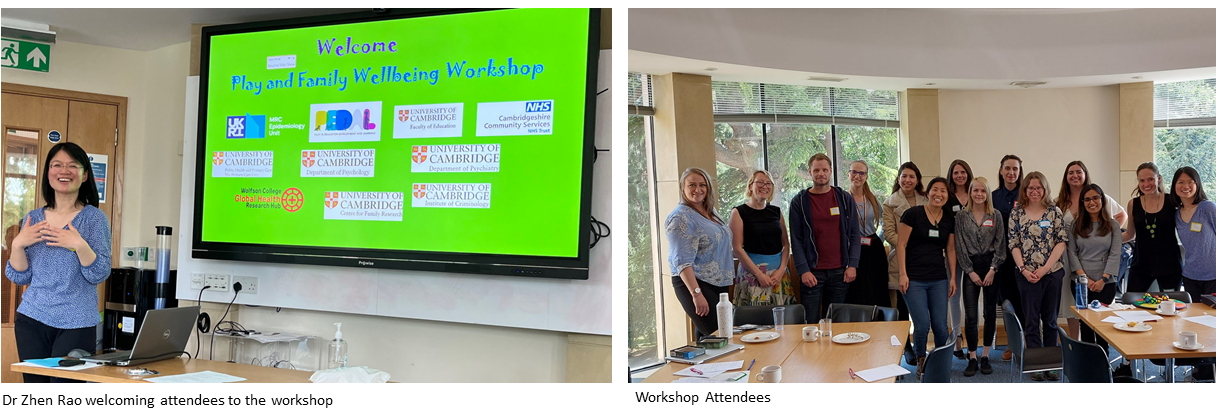
From the participants:
During the workshop, 15 researchers from different departments/research centres presented their research projects and ideas, with topics ranging from risky play, guided play, physical activity, parent-child interaction, to mental health, family intervention, hospital intervention, play therapy, to mealtime talk, self-regulation, autism, children’s voices, and practitioners’ perspectives.
“I’ve had thoughts and ideas from the workshop bouncing round in my head – so many fascinating topics!”
“It’s so inspiring to have all these people together discussing play, families, and wellbeing!”
“We seem to be a community with differing areas of interest and expertise, but a common goal in improving children’s (and parents’) lives.”
Wolfson was delighted to welcome senior leaders from Lee Kong Chian (LKC) Medical School, Nanyang Technological University (NTU), the National Health Group (NHG), and the Cambridge Centre for Advancement of Research and Education in Singapore (CARES) to dinner at College on Thursday 7th April, 2022.
Following a visit to Professor Nick Wareham, Wolfson Fellow, and his team at the MRC Epidemiology Unit to discuss their ongoing joint Global Health Initiative, our visitors from Singapore were invited to Wolfson for dinner, and were treated to a tour of the College including the Lee Library, Betty Woo Lee gardens and Lee Seng Tee Hall, an opportunity to recognise the founding philanthropy of Dr Lee Seng Tee, an honour shared by both Wolfson and LKC.
Prof Nick Wareham welcomed guests, and during dinner there was an opportunity to celebrate Wolfson’s long association with Singapore; ongoing collaborations between Fellows and Colleagues at NTU / LKC / NHG / CARES; and to look forward to future opportunities to develop fruitful academic relationships, particularly in the areas of Global Health and Sustainability and the role that the College can play in strengthening relationships between the University and Singapore.
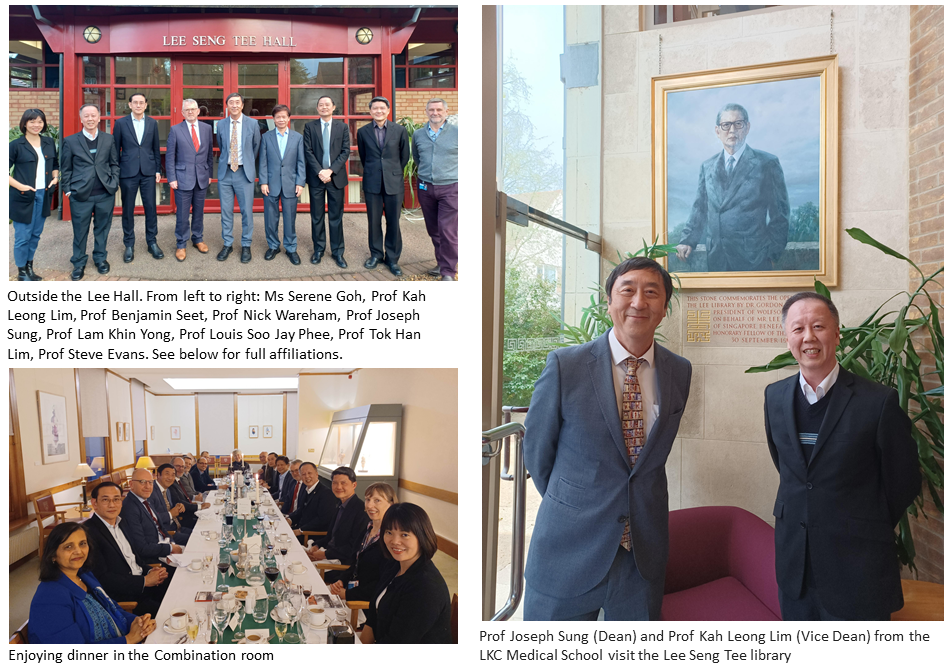
Guests from Singapore / Cambridge:
Prof Lam Khin Yong, Senior Vice-President – Research, NTU; Prof Joseph Sung, Dean of LKC Medical School, NTU; Prof Kah Leong Lim, Vice Dean at the LKC Medical School, NTU; Prof Simon Redfern, Dean of the College of Science at NTU; Prof Louis Soo Jay Phee, Vice President -Innovation & Entrepreneurship, and Dean of the College of Engineering, NTU; Prof Tok Han Lim, Group Chair, Medical Board, NHG, and adjunct Professor LKC Medical School; Prof Benjamin Seet, Deputy Group Chief Executive Officer (education and research), NHG, and group Chief Research Officer adjunct prof at LKC; Ms Serene Goh, Director & Institutional Coordinator & Director, teaching and education, NHG; Prof Markus Kraft, CARES Director at Cambridge Centre for Advanced Research and Education in Singapore. Prof Nita Forouhi, MRC Epidemiology Unit, Cambridge; Dr Soren Brage, MRC Epidemiology Unit, Cambridge. Dr Jethro Akroyd, Dept. Chemical Engineering, Cambridge and CARES.
From Wolfson:
Prof Nick Wareham, Head of the MRC Epidemiology Unit, Cambridge and Wolfson Fellow; Prof Steve Baker, Professor of Molecular Microbiology, Cambridge Institute of Therapeutic Immunology and Infectious Disease, and Wolfson Fellow; Ms Joanna Chevins, Bursar, Wolfson College; Ms Sian Cook, Development Director, Wolfson College; Prof Steve Evans, Director of Research in Industrial Sustainability at the Institute for Manufacturing, Department of Engineering, and Wolfson Fellow; Prof Rosemary Fricker, Convener of the Global Health Hub at Wolfson and visiting Professor of Neurobiology, Keele University
On Tuesday, March 15th, 2022 Around thirty of us gathered in Lee Hall, with thirty more watching the online stream, to hear the famous human rights advocate from South Africa, Fatima Hassan, express her take on the immense inequality of vaccine access in the world.
The evening was organised by Students for Global Health, Just Treatment, Universities Allied for Essential Medicines and Global Justice Now, as part of a UK-wide speaker tour on vaccine inequity. The intention of the tour was to raise awareness, and mobilise students and civil society to engage and follow up with some direct action. Wolfson College was privileged to host the Cambridge leg of the tour.
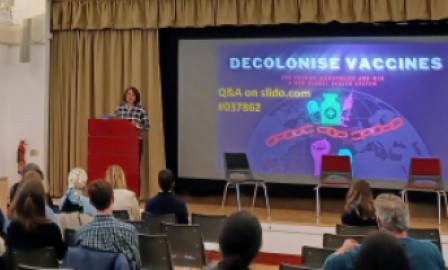
Joining Fatima on stage were Tolullah Oni, Wolfson Fellow, and moderator of the event, Rhiannon Osbourne and Emma Glennon. “As we enter our third year of the Covid-19 pandemic, while 73% of people are fully vaccinated in high income countries, in low-income countries this figure stands at just 7%.” Dr Tolullah Oni began the evening with a shocking fact for the audience to think about and feel uncomfortable with. To motivate action, sometimes we must be pushed into discomfort.
Fatima delivered her talk in the style of a brilliant legal practitioner: sharing devastating insights in a clear and concise way that was backed up by evidence, and motivated with testimonies of human experience. Not only did she highlight the importance of solidarity in global health from a humanitarian perspective, she made very clear that “It is a basic public health strategy to prioritise all people at risk in the world at the same time,” engaging with the argument from the perspective of anyone in the world who has an interest in ending the pandemic. It was remarkable and sobering too to hear her perspective in the context of her work on HIV/AIDS treatment in South Africa, which really makes it clear that the structure of the relationship between pharmaceutical companies and governments has been problematic for years, and seriously requires systematic change.
“Promises from pharmaceutical companies are not enforceable. There should be pressure to share knowledge that should have been a public good.”
Panellists Rhiannon Osbourne and Dr Emma Glennon enriched Fatima’s address from the perspectives of a student activist and an infectious diseases epidemiologist; placing the crisis of vaccine inequity within the frameworks of decolonisation and the climate crisis. We were challenged to imagine a world in which current systems are dismantled and new ones are built on the foundation of solidarity and collective value, with no one left behind.
As a Wolfson student studying Global Health, and as President of Students for Global Health Cambridge, I felt incredibly proud to be on the organising team for this event, and I hope it is only the start of mobilisation on issues, even if to get ourselves there we have to engage with facts, processes and perhaps consequences that make us uncomfortable at our core.
Students for Global Health Conference: The global burden of mental health and substance use disorders have been rising steadily since 1990. However, mental health expenditure per capita still sits at around 2% of high-income countries and even lower for low- and low-middle-income countries. The treatment gap is therefore huge. In light of this context, Students for Global Health Cambridge submitted an application to host the national conference for 2021/22 on the theme of integrating mental health into primary care. Students for Global Health is a national student network with the aim of promoting a fair and just world in which equity in health is a reality for all. We do this through education, advocacy and training. In collaboration with the Global Health Hub at Wolfson, SfGH Cambridge, led by Population Health Sciences MPhil student Natasha Salant, were able to host 35 participants from around the United Kingdom for a weekend of talks, training sessions, panel discussions and workshops around the theme of mental health on 12th and 13th March, 2022. Speakers included Sarah Kline from United for Global Mental Health, Professor Crick Lund from Kings College London, Lauren Magoun from Dimagi and Don Zane Muwanguzi from Awesome Mind Speaks, Uganda. We learned a great deal from the packed agenda, but the most valuable element of the conference was probably the energetic space that was created by having 35 minds in one room, to share experiences and ideas. SfGH Cambridge is so grateful to Wolfson for giving us the opportunity to collaborate with the Global Health Hub!

On September 14th, 2020, we hosted a successful and engaging second event. If you did not get a chance to attend our live webinar, you can catch up on the provocative thoughts shared by a diverse range of global experts here.
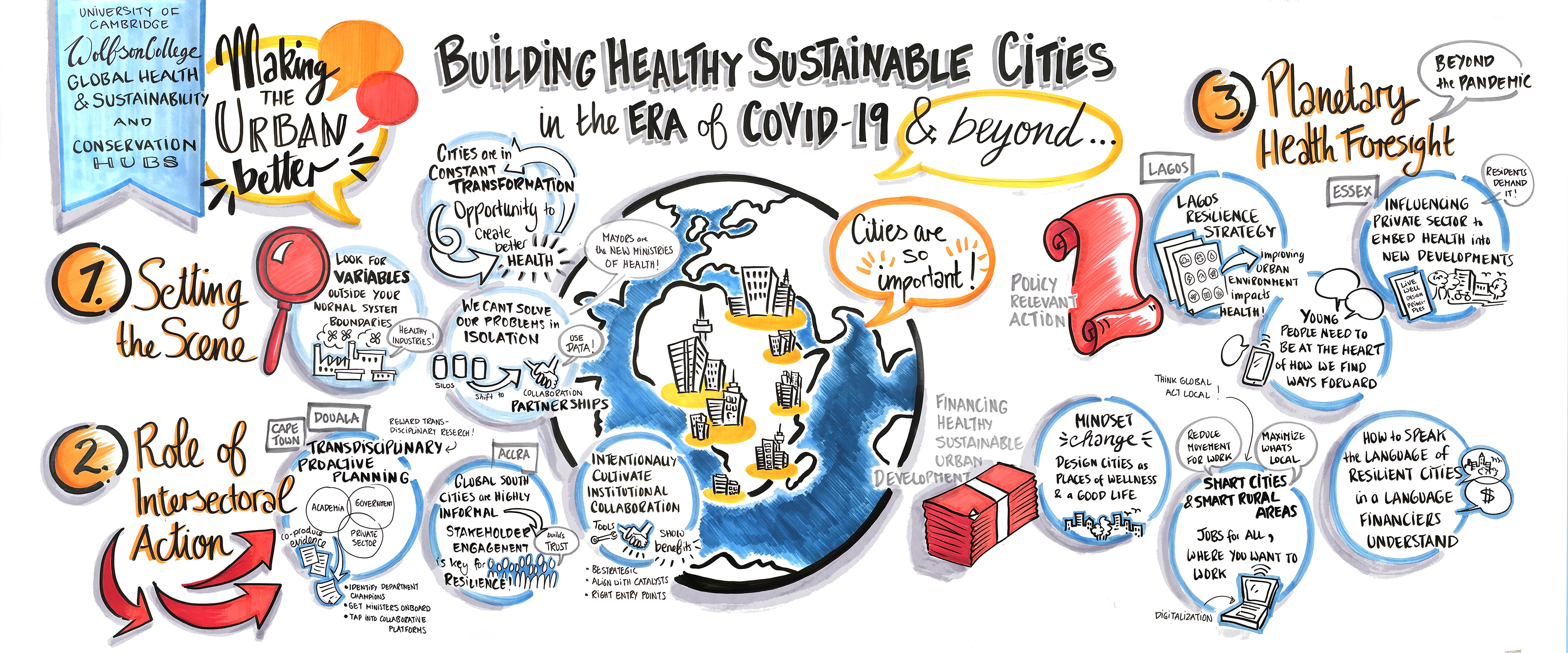
Email us at gh-hub@wolfson.cam.ac.uk if you would like to host an event under the aegis of the Hub.
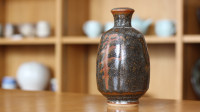
A display of works from the Bradshaw-Bubier studio pottery collection.
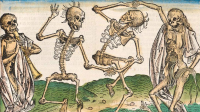
How we can develop ‘death activism’ – a variety of tactics and posthuman practices which celebrate death, its inevitability, its forms, from the slow to times of crisis, and how can trauma and mourning emerge as their own forms of expression, or even activism?
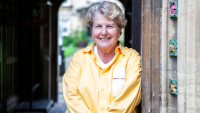
We are delighted to welcome Sandi Toksvig OBE as our speaker for Wolfson's prestigious Lee Lecture this year.
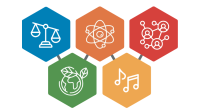
Join us for the 2024 Wolfson Research Event: an interdisciplinary academic conference organised by students to showcase the diversity of the research carried out by Wolfson students.
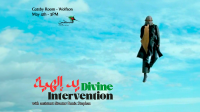
Screening of Elia Suleiman’s Divine Intervention, in conversation with assistant director Rania Stephan.







